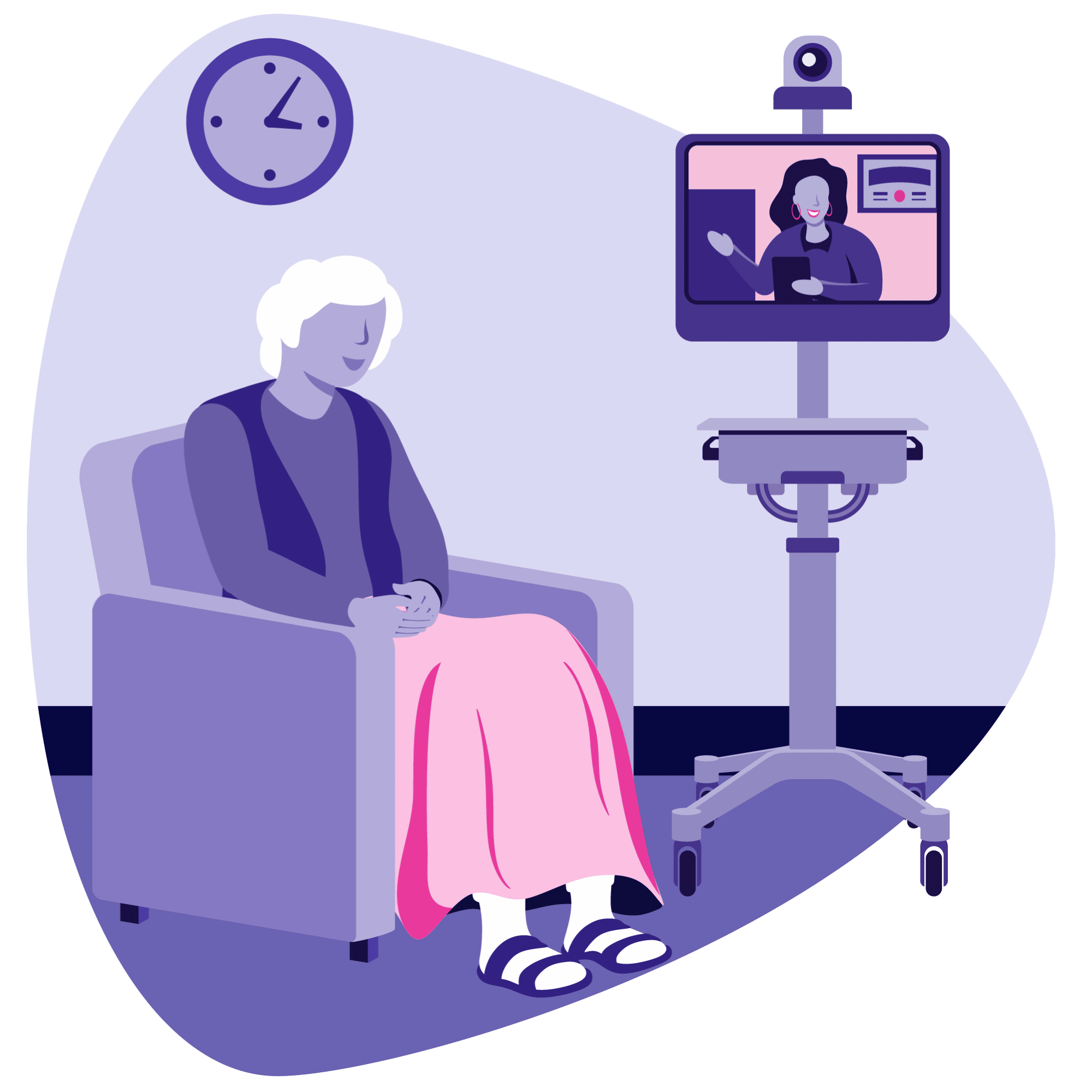As the healthcare industry evolves, one thing is certain: telehealth is here to stay. In fact, we believe that telepsychiatry is revolutionizing the way healthcare organizations approach behavioral health.
Below we share five ways telepsychiatry is shaping the future of behavioral health and how your organization and patients can benefit.
1. Telepsychiatry equalizes behavioral healthcare access nationwide
Telepsychiatry is far from new. Before the COVID-19 pandemic, Iris Telehealth worked with healthcare organizations to leverage telepsychiatry to provide quality behavioral health care.
However, due to federal and state-wide telehealth restrictions, many patients were cut off from quality care due to their geographical location.
In fact, a 2018 Pew Research Center survey found that 25% of rural residents travel approximately 34 minutes to get to the nearest hospital. The Association of American Medical Colleges (AAMC) also reports that 150 million people live in mental health professional shortage areas. To make matters worse, many rural hospitals suffer from these shortages, and the AAMC says the country will be short between 14,280 and 31,109 psychiatrists, psychologists, and social workers in a few years.
However, after COVID-19 started impacting communities across the country, telehealth restrictions loosened, and suddenly millions of patients had the option to meet with their healthcare providers via a smartphone or another digital device. And, this level of access has continued.
By utilizing telehealth for behavioral health, Patients in both urban and rural locations can use telepsychiatry to access psychiatric services faster and get the care they need. They can also overcome financial constraints to psychiatric care, such as having to miss work or arrange childcare to travel to a psychiatrist’s office.
2. Telehealth increases medication adherence and follow-up visits
Mental health patients are often subject to being labeled with terms, such as “noncompliant,” “difficult,” and “frequent flyer.” But underneath these stigmas lies a stark truth: many of these patients are facing evidence-based barriers that prevent them from continuing their psychiatric care.
These barriers include:
- Socioeconomic obstacles (e.g., poverty, lack of insurance coverage)
- Feelings of guilt and shame
- Misunderstandings around their mental health condition
- Mistrust toward healthcare providers
Comprehensive patient support is vital to eliminating these hurdles. This support includes extensive education, accurate diagnosis, and targeted treatment from compassionate psychiatric providers – including through telehealth.
Through telepsychiatry, healthcare organizations can drive patient engagement while helping patients overcome stigmas, attend follow-up appointments, and strengthen medication adherence.
In fact, according to a recent 2022 Health Care Insights Study conducted by CVS Health, researchers found that over half of consumers say the availability of virtual mental health services would increase their chances of seeking care.
3. Telepsychiatry enhances patient-provider flexibility
For both patients and providers, long wait times are often a significant burden in behavioral healthcare. Telepsychiatry can help solve these issues by decreasing the time it takes for mental health patients to see a psychiatric provider.
Rather than waiting hours for an in-person visit, patients can speak with a telepsychiatry provider in minutes. Telepsychiatry meets patients wherever they are — whether in their home or another remote location. In addition, patients can receive information about their care (from the telepsychiatry provider) via text message or email.
This flexibility delivers greater patient satisfaction and wellbeing —all while lightning staff workflows and allowing healthcare organizations to grow their cost savings.
4. Telepsychiatry boosts collaboration among stakeholders
Innovations like artificial intelligence and telepsychiatry have given new meaning to collaboration. For example, in telepsychiatry, we can use the patient data — obtained from digital forms and other health tools — to guide psychiatric care and communicate more precise, targeted insights to the healthcare team.
We’ve also seen stronger collaboration among legislators in the form of bipartisan telehealth policies designed to address real patient concerns, including mental health care. This leads us to believe that telepsychiatry will continue to add significant value to providers and patients long after the pandemic.
However, there’s still a lot of work to be done. For starters, there are only hints of what telehealth reimbursement will look like going forward. Therefore, it’s important for healthcare organizations to stay on top of federal, state, and FDA developments. This focus will ensure your organization makes well-informed decisions when it comes to psychiatric patient care and support.
5. Telepsychiatry aids in the shift to value-based care
The healthcare industry is increasingly leaning towards value-based care — most notably, population health. This shift means the traditional fee-for-service model is slowly disappearing, thereby motivating healthcare organizations to remove silos and take a more holistic approach to patient care.
It can be challenging to understand all the different aspects of population health, let alone develop cost-effective strategies to implement it. That’s why it’s crucial to partner with vendors that can help your organization achieve sustainable population-health success.
For example, partnering with a technology-neutral provider like Iris Telehealth saves you from having to invest in a special software platform, electronic medical record (EMR), or equipment. By partnering with a technology-neutral vendor, qualified psychiatrists and psychiatric nurse practitioners will utilize your organization’s existing EMR and equipment.
That means an easier transition to a long-term telepsychiatry program, cost savings, more satisfied staff, and most importantly, better mental and population health outcomes.
The bottom line
Telepsychiatry has become the new normal and will continue to impact the telehealth behavioral health space in big ways. Whether it’s opening up access to quality care or helping EDs meet high patient demand, there’s no doubt that telepsychiatry has created a brighter future for behavioral health care.
People are leaning on telehealth as a tool to help them meet their mental health needs and the data speaks for itself:
-
- 93% of providers believe virtual visits increased the chances of patients keeping their appointments
- 71% of consumers believe virtual mental health services would be more convenient
- 57% of providers believe access to mental health professionals would be very helpful to their patient population
If you’re looking for highly qualified, compassionate psychiatrists and psychiatric mental health nurse practitioners, Iris Telehealth can help. Contact us for more information about starting a telepsychiatry program that can improve your organization’s behavioral health outcomes.


